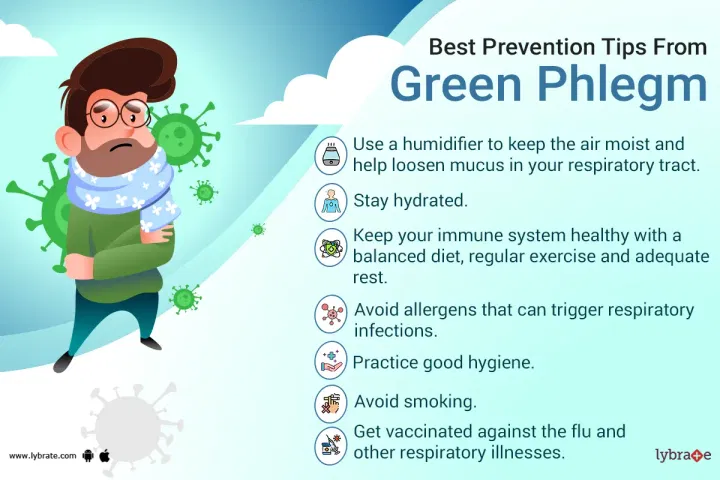Green Phlegm: What Are the Things You Must Know?
Phlegm can be simply defined as a type of mucus that is secreted in your chest area. You usually don't generate large amounts of phlegm unless you are under the weather with a cold or have another medical or health problem. Furthermore, you should also know that the phlegm you cough up is usually referred to as 'sputum.'
Do you ever notice that your sputum has different colors and wonder what they mean? There are many different conditions that can cause you to produce phlegm, and it can often have different colors depending on the condition. This article and guide will explain some of the conditions that cause phlegm production, the different colors that it can take, and when you should seek medical attention.
What does phlegm that is ‘green or yellow’ in color mean?
If you notice that you are coughing up green or yellow phlegm, it is most likely an indication that your body is combating an infection. The color (green or yellow) is a result of white blood cells.
You may notice that your phlegm has turned yellow or green in color when you are sick. The color change happens as the sickness gets worse. Green or yellow phlegm can often be caused by the following conditions:
Bronchitis
This condition begins with a dry cough in most cases, and then after a few days, you might notice your phlegm turning clear or white. If this condition progresses, you may start to see yellow and green phlegm, which is a sign of a secondary bacterial infection. Further, it must be noted that this kind of coughing can last up to 90 days.
Pneumonia
This is usually a complication caused by another respiratory issue. You might notice that you are coughing up phlegm that is green, yellow, or red when you are suffering from pneumonia. The red color may be due to blood in the phlegm.
The symptoms you experience with this health condition will depend on the type (of pneumonia) you have. All types of pneumonia share some common symptoms, such as chills, fever, uncontrollable coughing, and shortness of breath.
Sinusitis
It is a condition characterized by the inflammation of the sinuses. It can be caused by viruses, allergies, or bacteria. Sinusitis can cause symptoms such as a runny nose, headaches, and fatigue. If you think you might have sinusitis, it is very important that you go about seeking medical help as soon as possible so that you can get proper treatment on time.
If you notice any symptoms such as coughing up yellow or green phlegm, postnasal drip, nasal congestion, or pressure in your sinus cavities, it may be because of bacteria.
Cystic Fibrosis
It is a chronic lung disease that mostly affects young adults, adolescents, and kids. It is characterized by the buildup of thick mucus in the lungs, which can further give rise to difficulty breathing and other serious health problems. The different colors of phlegm can be caused by the buildup of mucus and are, for example, yellow, green, or sometimes brown.
How can green phlegm be treated?
When you have phlegm in your respiratory system, it can cause a lot of discomfort and make it hard to do your daily activities. In order to feel better, it's important to focus on minimizing the uncomfortable symptoms you're experiencing, such as the green phlegm that comes with coughing. Take the necessary steps to see relief by:
Keeping yourself hydrated and eating healthy foods
It's important to keep your body hydrated and fueled when you're trying to recover from a respiratory infection. Drinking plenty of fluids helps thin the phlegm in your airway and keeps your immune system strong. Eating healthy foods is also key to bouncing back from an illness.
Putting a humidifier to use
A humidifier can be a great way to ease sinus and respiratory symptoms. By keeping your respiratory system hydrated with ambient humidity, you can help reduce congestion and other discomforts. Remember to drink plenty of fluids as well, such as water and juice, to keep your system hydrated from the inside out.
Relying on home remedies or natural treatment options
If you are looking for some relief from your sore throat that has been coughing up green phlegm, there are a few time-honored, tried-and-tested home remedies you can try. One of them is gargling with salt water, which can help to loosen phlegm and ease the pain. Apart from this, you can apply eucalyptus oil or poultices to your chest, which can also help you feel better.
Going for over-the-counter medicines
Over-the-counter medicines can help provide symptom relief if you're coughing up green phlegm, but it's always best to consult your doctor first to see which one will work best for your individual condition.
Taking the ample rest that your body requires
Coughing up green phlegm can also be a sign that your body needs rest, so make sure to listen to it! Pushing yourself to return to your normal routine too quickly after an infection or ailment can stall the healing process, so it is important to take the time you need to recover fully.
When should you seek medical help?
If your cough does not dissipate after a few weeks or is accompanied by any of the following, you should consult your doctor:
- Coughing up thick, greenish-yellow phlegm
- Wheezing
- Fever
- Shortness of breath
- Fainting
- Ankle swelling or weight loss
Conclusion:
Although coughing is a natural reaction to your body fighting an illness, the color of your phlegm can be an indicator of what is going on inside your body. For example, if you notice that you are coughing up green or yellow phlegm, it is most likely an indication that your body is combating an infection. The color of your phlegm can give you an idea of the severity of your illness.
There are a number of conditions that can cause your body to produce yellow or green phlegm, but the most common is a respiratory infection. If you are unsure about what is causing your body to produce yellow or green phlegm, it is always a good idea to consult a medical professional.
Furthermore, we hope that you found this article helpful. If you are looking for more informative content like this, be sure to visit us again.



+1.svg)
